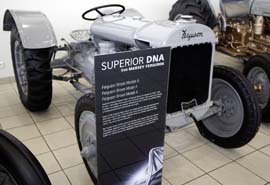MF celebrates 75 years of the Ferguson Brown

Massey Ferguson is celebrating 75 years since the introduction of the renowned Type A Ferguson Brown tractor, which went into production in June 1936.
The Ferguson Brown is seen as the tractor that began the power farming revolution, as it was the first machine to have the Ferguson three-point linkage system which can be found on every machine used for farming today.
Massey Ferguson brand development manager, Campbell Scott, says how proud he is of the rich heritage and history of the brand. “Massey Ferguson is immensely proud of its heritage, which encompasses virtually every major innovation in tractor technology, from the three-point linkage, which went into production on the Ferguson Brown, right through to the launch of the first ever Selective Catalytic Reduction system to be used in agriculture on the MF 8600 Series.”
Mr Campbell stresses the importance of recognising the founding fathers of the company – Daniel Massey, Alanson Harris and Harry Ferguson – as they made an enormous contribution in “mechanising and changing the face of farming across the globe.”
To celebrate the anniversary and to show the contribution the company has made to the world of farming, a display area has been created in the Massey Ferguson Technology Centre at AGCO’s Beauvais manufacturing facility in France.
The highlight of the display is the first ever production model of the Type A No 1, which made its first public debut in April 1936 in Harry Ferguson’s home county in Northern Ireland, which is why he often referred to it as the “Irish tractor”.
Not only was the Type A fitted with the first ever three-point linkage system, but it also featured many other of Harry Ferguson’s pioneering manufacturing ideas, such as the use of high-tensile bolts with specially-hardened heads. This began the production of a light and agile tractor that was easy to use and, ultimately, changed the face of farming forever. Harry Ferguson described the Ferguson Brown as not merely a tractor, but as mechanisation which would entirely supersede the horse.

